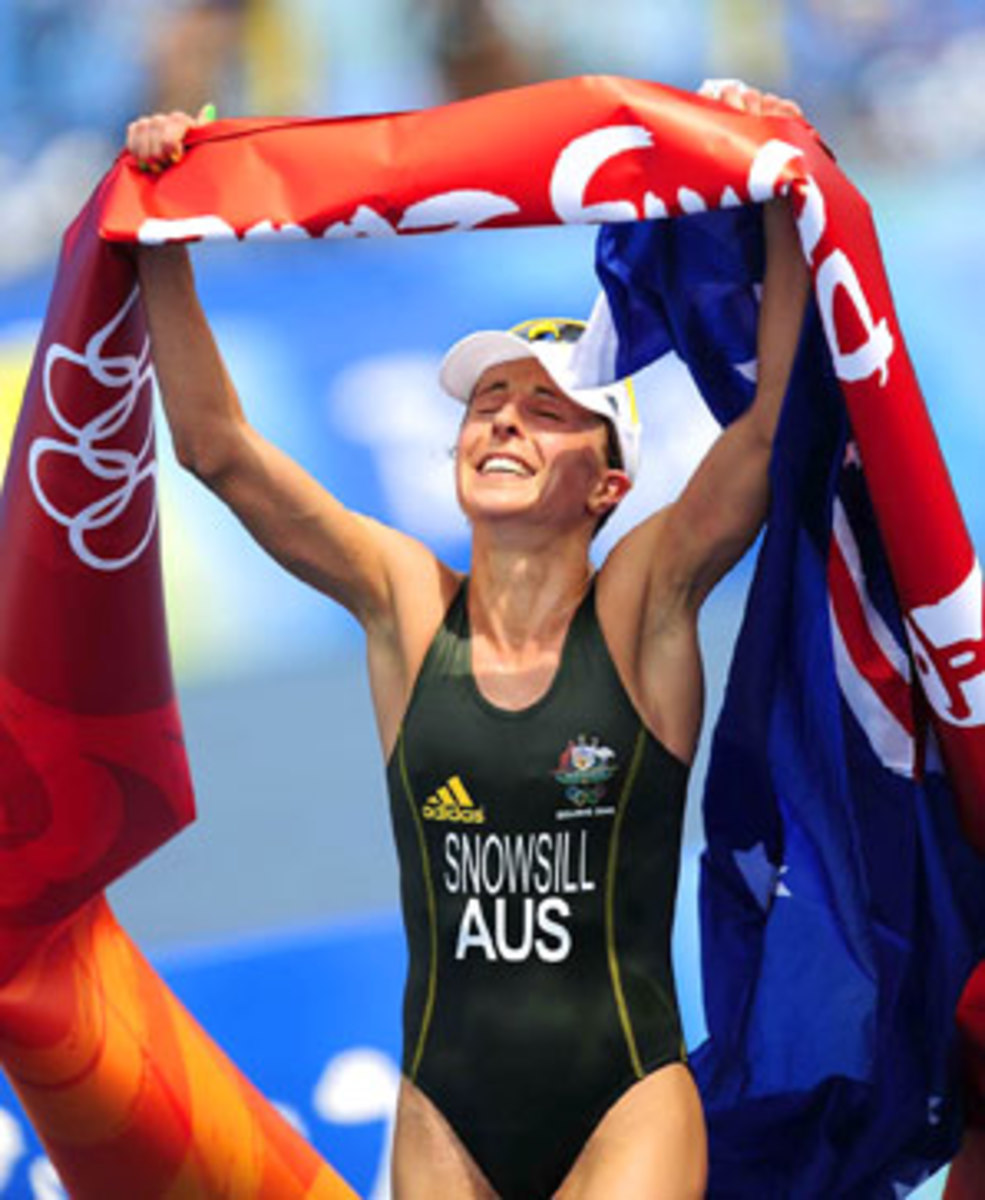Triathlete Snowsill overcomes physical, mental obstacles for gold


Triathletes generally maintain a stoic expression of concentration throughout their grueling race, but as Emma Snowsill entered the final straightaway at high noon today, a flash of white could be seen on her face through the waves of heat rising from the track at the Ming Tomb Reservoir.
Grinning, she slowed to grab an Australian flag from a fan in the stands and then broke the tape, more than a minute before her rival, Vanessa Fernandes of Portugal, who took silver. It was a grateful moment for the 27-year-old Snowsill, a triumphant cap on a half-decade as turbulent as the course she had just finished.
In 2002, her boyfriend, a fellow triathlete, was killed in a car accident while the couple was out on a training ride. Snowsill bounced back, claiming the world title a year later. Two months after that, the newly crowned world champ came up six seconds short of qualifying for her homeland's Athens Olympics roster and was left behind.
Snowsill had the option of competing for New Zealand, her father's birthplace, but she decided against it, remaining loyal to the country that had the ability to offer her a discretionary spot on the team but chose not to. "If I win, I want to win for Australia," she said at the time. "I want to be in the green and gold, not the black and white."
She bounced back again, demolishing the field by four minutes at the Chicago Triathlon while her compatriots were off in Greece. And again, posting back-to-back victories at worlds in 2005 and '06.
But in 2007, her life took another unexpected turn when she abruptly stopped winning. Just like that. Snowsill couldn't shake the slump, which, for her meant mostly coming in second, except for a DNF (did not finish) in Des Moines last June -- the first, and only, in her career. She and her coaches were baffled by her drastically reduced performances, until she was diagnosed with asthma shortly thereafter.
Although she had an inhalator tucked in her swimsuit (it's unclear whether she used it during the race), Snowsill showed no signs of being intimidated by her condition, or by the reported pollution in Beijing. It was a clear, hot day in the mountains outside the city center, and Snowsill broke away from the others as they transitioned from bikes to a footrace.
Fernandes, winner of a record 20 World Cups, stayed in the lead pack but couldn't catch Snowsill at the end. Fernandes took the world title from Snowsill last year, and beat her again at the test event in Beijing last September.
The 22-year-old Portuguese not only failed to defend her crown at the world championships this year, however, but placed a disappointing 10th, suffering from hypothermia on the Vancouver course. Her Olympics preparation was supposed to be tailored toward a climate closer to Beijing's -- in August, anyway -- so her coach wasn't worried about his athlete's performance in China.
Fernandes indeed maintained a strong showing all morning, particularly during the bike ride, arguably her best leg. However, her advantage there was diminished because drafting is legal in Olympic triathlons, and at moments during the ensuing run, she switched up positions with Australia's Emma Moffatt and the United States' Laura Bennett, who finished third and fourth, respectively.
"I was just trying to hang on to that position," says Bennett, who was in the silver-medal slot at one point but cramped up during the penultimate lap and just missed the podium. The four-time world medalist earned a bronze at the World Cup in Beijing last fall and led all competitors out of the water today. "I had to get my feet back and my guts back. I'm very happy [with my finish]."
Bennett's teammates, Sarah Haskins and Julie Swail Ertel, finished 11th and 19th, respectively.
The gracious Fernandes, who smiled through a mouthful of braces, expressed satisfaction with her race. "This little Portuguese country, we started learning about triathlon late," she said. "It's good for Portugal and Europe to put this little girl on the medal stand at an Olympic Games."
Perhaps it's only fitting that triathletes, who push their physical selves to the brink, to train their mindsets just as rigorously. It's certainly helped Emma Snowsill.
"I think everybody has a personal story, and everybody deals with it in different ways. You can only take control of the moment now," she said after her victory. "Lessons learned through life are there not necessarily for good or bad reasons. It was a great motivation for coming to Beijing."
As she increased her lead with each lap run, you could almost see the ghosts of her past troubles, left behind in her wake.
